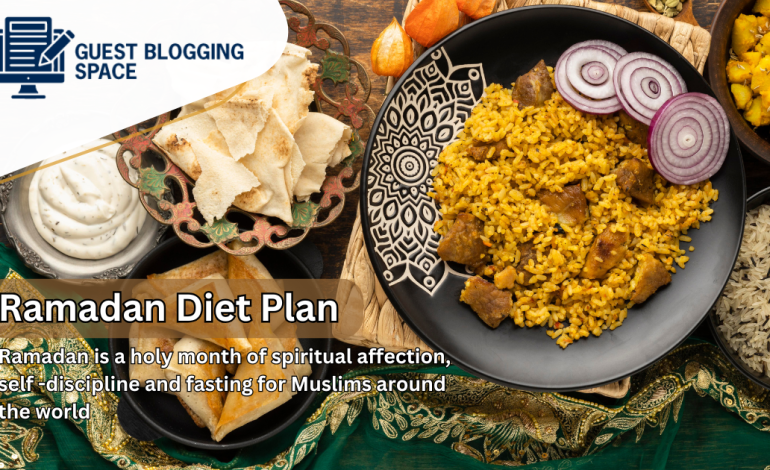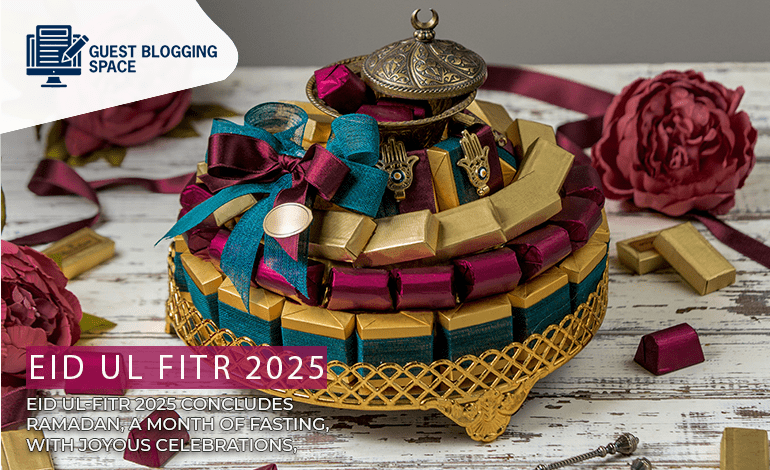Ramadan Diet Plan for Weight Loss: Last guide for men

Read this Article for Ramadan Diet Plan: Ramadan is a holy month of spiritual love, self-discipline, and fasting for Muslims around the world. While the primary purpose is spiritual growth, the month also provides a unique opportunity to adopt healthy eating habits and shed excess weight. Following a well-structured Ramadan Diet Plan is essential for maintaining energy levels and achieving weight loss. A balanced diet with proper hydration, nutrition, and exercise is key. In this article, the Guest Blogging Space team tells you how to follow an effective Ramadan Diet Plan.
This guide, brought to you by Guest Blogging Space, will provide you with a customized Ramadan Diet Plan to lose weight, while keeping you energized and healthy throughout the month.
Understand Ramadan diet plan schedule and weight loss.
Fasting from dawn to sunset (Maghrib) naturally leads to a calorie deficit, which is essential for weight loss. However, many people overeat during sehri (Eastern morning meal) and iftar (evening meal) and gain weight instead. Here are the keys to losing weight with the Ramadan Diet Plan:
- Consumption of nutrients for nutrients to maintain energy levels.
- Avoid excessive caloric intake in Suhur and iftar.
- Stay hydrated to prevent fatigue and creep.
- Including light exercise to preserve muscles and promote metabolism.
Main principles of healthy Ramadan diet plan
Before diving in the dietary plan, some basic principles must be remembered:
-
Stay hydrated
Dehydration can be fatigue, headache and dull. Make sure you drink at least 8-10 glasses of water between iftar and Suhur. Avoid sugar and carbonated beverages as they can lead to dehydration.
-
Give preference to nutritional foods if, you follow Ramadan Diet Plan
Choose whole grains, lean protein, healthy fat and fiber -rich foods. They provide continuous energy and have hunger in golf.
-
Avoid exceeding
Eating more and more after fasting through the day can slow me.
-
Choose healthy cooking methods
Instead of fried foods, choose a grilled, baked or steamed dishes to cut unnecessary calories.
-
Include light training
Although acute workouts can be difficult, facilitating activities such as walking or stretching before Iftar or before Suhur can help maintain muscle and promote fat losses.
Suhur: Foundation for a Healthy Day
Suhur is a premature meal that gives your body fuel for the next day. A well -balanced suhhur helps prevent hunger pain and fatigue. Here’s an example of the Suhur Dineing Plan:
-
Oats with chia seeds and almonds
- High fiber to complete you for a long time.
- Chia seeds provide omega -3s and protein.
- Almonds provide healthy fat and energy.
-
Greek yogurt with berries and honey
- Greek yogurt is protein rich and helps digestion.
- Jamuns provide antioxidants and fiber.
- Honey provides natural sweetness without blood sugar spikes.
-
A full wheat steep with avocado and eggs
- Complex carbohydrates provide continuous energy.
- Avocado provides fiber and healthy fat.
- Eggs are an excellent protein source.
-
Hygiene
- Start Suhur with a glass of water.
- Herbal teas can help digestion.
Iftar: quickly breaks the healthy way
After fasting all day, it is important without fulfilling the energy level again. Balanced in terms of optimal nutrition and supports weight loss.
-
Date and water
- Dates provide important minerals such as natural sugar and potassium and magnesium.
- Water helps the body to enhance effectively.
-
Dal
- A light, broth -based soup is easy to hydrate and digest.
- Pulses and vegetables provide fiber, protein and vitamins.
-
Grilled chicken or fish
- Lean proteins promote muscle repair and satisfaction.
- Avoid fried meat to reduce calorie intake.
-
Quino
- Whole grain stabilizes blood sugar and provides permanent energy.
- Rich in fiber they help control hunger.
-
Fresh salad with olive oil and lemon
- Bladed greens, cucumbers and tomatoes provide important vitamins and fiber.
- Olive oil adds heart-healthy fat.
-
Herbal teas and more water
- Herbal tea -Mint or chamomile help as digestion and relaxation.
- Continue to drink water to maintain moisture.
Healthy Snacks between Iftar and Suhur
Eating small, nutritious snacks between iftar and Suhur can make you energetic and prevent more than food.
-
Nuts and seeds
- Almonds, walnuts and pumpkin seeds provide healthy fat, protein and fiber.
-
Hummus with Veji
- Humus plant -based protein is high.
- Couples with carrots, cucumbers or bell peppers for a sharp and satisfactory snack.
-
Fresh fruit
- Apples, berries or oranges have little calories and are rich in vitamins and fiber.
-
Cottage cheese or Greek curd
- High protein and calcium to support muscle maintenance.
Tips to stay on track and follow Ramadan Diet Plan
Following a structured diet plan can be challenging, but these tips will help you keep you continuously:
-
Eat with heart
Chew slowly and taste every bit. Eating quickly can cause excessive food intake and discomfort in digestion.
-
Limit sugar and processed food
Avoid refined sugar, fried foods and processed snacks. These cause weight gain and energy accidents.
-
Trained smartly
Before Suhur or after iftar, you can participate in light exercises such as tensile, yoga or low trips.
-
Get enough sleep, it is a part of Ramadan Diet Plan
Lack of sleep interferes with metabolism and increases the creeps. Rest at least 6-7 hours per night.
-
Contact a nutritionist
If you have health conditions such as diabetes or high blood pressure, seek professional guidance before starting a new diet plan.
Final thoughts about Ramadan Diet Plan
Ramadan is the time for spiritual and physical change. By following a balanced diet, keeping you hydrated and practicing aware of eating, weight loss during this holy month is worth losing. Small, consistent changes lead to permanent results. Be aware of nourishing your body, staying active and embracing the blessings of Ramadan.
For more valuable insights into health and well -being, the Guest Blogging Space to the blog site and finds out specialized materials to help stay in shape under Ramadan and also you read about Ramdan Diet Plan
Frequently asked questions (common questions)
-
Can I lose weight during Ramadan with Following Ramadan Diet Plan?
Yes, by maintaining a balanced diet, avoiding surpassing and staying hydrated, you can effectively lose weight during Ramadan.
- What are the best foods for Suhur to eat?
Nutrients such as oats, eggs, Greek yogurt and whole grains are ideal as they provide continuous energy throughout the day.
- How can I avoid catching iftar?
Start with water and dates, eat slowly and bring fiber -rich foods to stay full without consuming excess calories.
- Is it okay to train during Ramadan?
Yes, but the possibility of mild practice such as walking or yoga, preferably after in the case or before Suhur.
- How do I stay hydrated while I am fast?
Drink plenty of water between iftar and suhur, and avoid sugar and caffeinated drinks that can cause dehydration.









